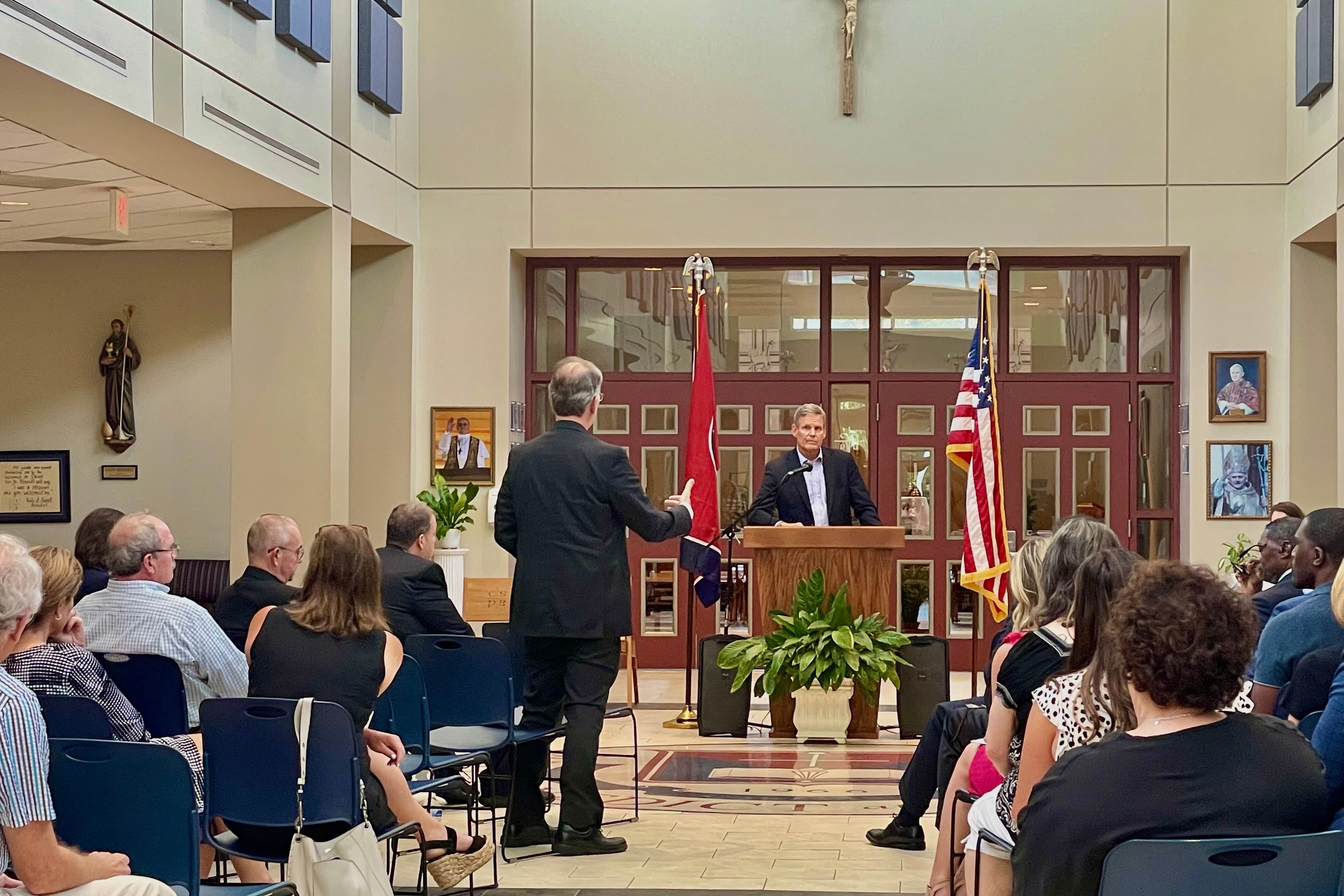Less than a week after judges allowed Tennessee to resume work on its long-stalled private school voucher program, the program’s website roared back to life, and forms are available online for families and private schools in Memphis and Nashville interested in participating.
By Wednesday, Gov. Bill Lee announced, some 600 families had completed the form, and 40-plus private schools in the two cities had committed to making seats available for them when the school year begins — just three weeks from now.
“There was an urgent need for school choice in 2019, and finally, parents in Memphis and Nashville won’t have to wait another day to choose the best educational fit for their children,” Lee said in a statement.
The July 13 court order lifted an earlier order that blocked the program from launching as originally planned in 2020. Within hours, Lee directed his administration to speed ahead to roll out the program, despite the tight schedule and looming legal efforts by voucher opponents seeking to block the start again.
Lee, who met with private school leaders in Memphis on Wednesday, surprised even his own education department by announcing last week that work would resume immediately “to help eligible parents enroll this school year.”
The flurry of activity shows Lee’s determination to swiftly enroll as many students as possible — up to the 5,000 allowed in the first year — after two years of delays and fierce legal battles over the state’s voucher law. Tennessee lawmakers had debated vouchers for more than a decade before a GOP-controlled legislature passed Lee’s 2019 education savings account proposal with a dramatic, razor-thin, and controversial House vote.
Picking up the pace
Tennessee has been a battleground in the national fight between those who want to use taxpayer money to give parents more education choices and others who say that approach diverts money from already underfunded public schools.
Leaders of the pro-voucher American Federation for Children have been key allies of the Republican governor in lobbying for the state’s voucher law and promoting the program, including organizing Wednesday’s meeting between Lee and about 45 private school leaders from the Memphis area.
The gathering was at St. Benedict at Auburndale High School, a Catholic campus located in the mostly white and affluent suburb of Cordova, east of Memphis, and where tuition costs over $13,000 a year. The average taxpayer-funded voucher would provide about $8,000 this year to help families pay expenses including tuition, fees, textbooks, computers, exams, and tutoring services at approved private schools.
Asked later by reporters how families might fill the gap, Lee said that “every school has a different strategy” for financial aid and that many already provide scholarships to students needing help.
The governor added that his education department was still working through a lot of the details.
In an interview earlier Wednesday with Chalkbeat, Education Commissioner Penny Schwinn acknowledged that her department faces a heavy lift with the expedited launch, starting with getting students and private schools to sign up, then making sure participants meet the state’s eligibility standards. The state also has to set up systems and processes for redirecting public education spending in Memphis and Nashville, the only two cities where the program is operating, to private schools and vendors.

“We’re really trying to catch up and meet the governor’s office’s expectations on this,” Schwinn said, “and to do so with a very clear focus that we will roll out when we feel like we can meet our commitments to families.”
State officials hoped to roll out the full program at the start of a new school year. But the timing got tricky when the state Supreme Court upheld the voucher law in May, and a lower court cleared the way for work to resume on the program just weeks before the Aug. 8 start of classes.
Lee’s administration settled for a rolling launch that gives families and private schools that want to participate three possible start dates to choose from.
“I think the timeline in July is very challenging for us,” Schwinn said, “and so right now, we just want to know how many parents are out there that might want to participate, and do they want to do it this August, this January, or next August?”
Managing the program is another challenge, and Schwinn is looking to Eve Carney, her chief of districts and schools, to oversee the application process and financial systems. The commissioner expects to hire an outside vendor to help with that oversight in the 2023-24 school year and said the department will seek bids for that work in the next few months.
The department already oversees a statewide private school voucher program for students with disabilities, but it is small in scope and had more time to launch in the middle of the 2016-17 school year with 36 families. Even so, the program has experienced some glitches responding to participating families as it has grown to 284 students amid staff turnover in the department.
Supply and demand
Another challenge is the capacity of private schools to accommodate families who want to participate.
For the original launch planned for the 2020-21 school year, 62 schools had signed on to participate. But the pandemic has created tremendous enrollment shifts, as more students than usual moved from public to private schools, especially in Nashville and Memphis, where districts stuck with remote learning and mask mandates the longest. Students in early grades pivoted the most, essentially filling up those private sector seats.
As private school leaders try to work with Lee’s administration under the expedited timeline, not everybody will get what they want, they say.
“Capacity will vary by individual schools,” said Sarah Wilson, executive director of the Tennessee Association of Independent Schools. “Some schools, particularly in the Nashville area, may only have room in one grade, if at all. Other schools have the capacity to add several students and are interested in doing so.”
Brad Goia, who leads a coalition of independent schools in the Nashville area, said “the likelihood of adding students now is not great.”
“Private schools by and large have benefited from a relatively strong economy and the popularity of Nashville, with lots of people moving in,” said Goia, who is also headmaster of Montgomery Bell Academy. “Most, if not all, private schools are close to capacity. I’m sure some schools would view this as a good opportunity to perhaps enlarge their base of diversity. And a few would look at it as a way to fill some seats.”
His counterpart in Memphis, Bryan Williams, said enrollment is “pretty much set for the year” at the city’s most competitive schools. But a small number of slots could be available at some schools, he said.
“There’s definitely some room for students to come in through ESAs, but that will vary from school to school,” said Williams, head of Christ Methodist Day School and director of the Memphis Association of Independent Schools.
Williams said his school could accommodate between five and 10 students at some grade levels. “If you spread those numbers across 30 schools, it can add up,” he said.
Admissions processes for private schools generally kick off a year before students enter, with most students applying by December and the most competitive schools setting their enrollment for the following school year by mid-March.
“Right now, the ESA program isn’t matching up with how private schools do admissions and enrollment,” Williams said.
Looming legal challenge
Voucher opponents behind two lawsuits against the state are expected this week to seek a court order blocking the program for a second time while they challenge the constitutionality of the law based on several remaining claims.
On Tuesday, attorneys representing nine public school parents and community members in Memphis and Nashville filed papers in Davidson County Chancery Court giving notice of their intention to seek an injunction this Friday. And on Wednesday, lawyers representing the governments of Shelby County and Metropolitan Nashville in a separate lawsuit filed a similar notice with the court.
Both groups asked for an expedited schedule for the judicial panel to consider their motions.
Asked Wednesday about the prospect of another bruising legal fight, the governor suggested that his administration will take matters one at a time.
“There’s been talk that that could possibly happen,” he said, “but we’re just working on the high-quality implementation of the plan right now.”
Marta W. Aldrich is a senior correspondent who covers the statehouse for Chalkbeat Tennessee. Contact her at maldrich@chalkbeat.org. Samantha West is a reporter for Chalkbeat Tennessee, where she covers K-12 education in Memphis. Connect with Samantha at swest@chalkbeat.org.







